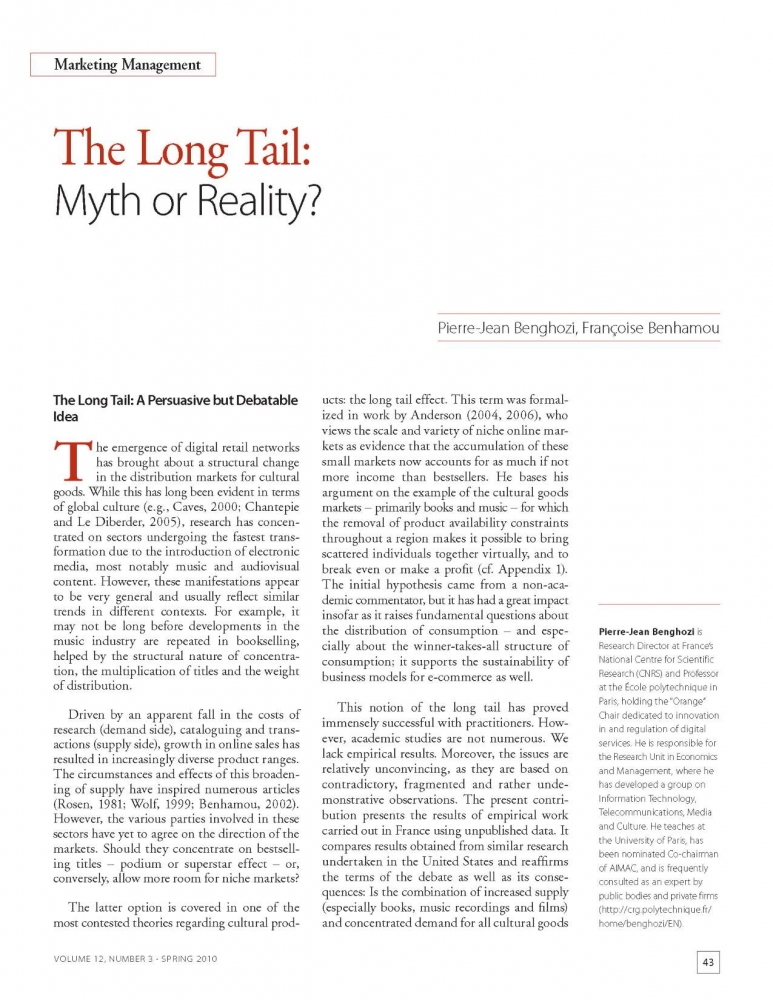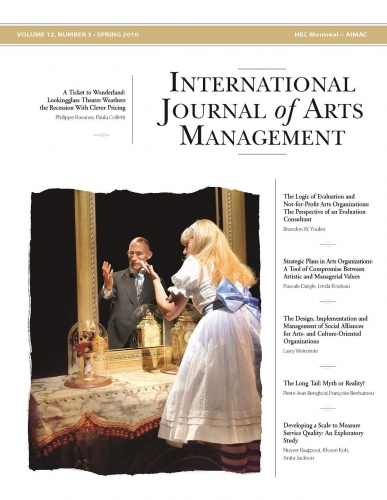The Long Tail: Myth or Reality?
Produit: Article
21,00 $ CA
Pierre-Jean Benghozi, Françoise Benhamou
Pierre-Jean Benghozi is Research Director at France’s National Centre for Scientific Research (CNRS) and Professor at the École polytechnique in Paris, holding the “Orange” Chair dedicated to innovation in and regulation of digital services. He is responsible for the Research Unit in Economics and Management, where he has developed a group on Information Technology, Telecommunications, Media and Culture. He teaches at the University of Paris, has been nominated Co-chairman of AIMAC, and is frequently consulted as an expert by public bodies and private firms (http://crg.polytechnique.fr/home/benghozi/EN).
Françoise Benhamou is Professor of Economics at the University of Paris 13 and a member of the CEPN research team. Her research focuses on cultural economics, especially cultural diversity and copyright. She has published extensively on these topics. She is also an expert for UNESCO and the French ministry of culture and is a member of the board of the Association for Cultural Economics International (www.univ-paris13.fr/ CEPN/cv_francoise_benhamou.pdf).
ABSTRACT
In 2004 the editor-in-chief of Wired magazine, Chris Anderson, made the assumption that the Internet was bringing together scattered markets for cultural products that had not hitherto been lucrative due to their narrow market appeal. With sales of these products aggregated, he argued, they were now becoming profitable. This assumption, referred to as the “long tail,” proved to be persuasive. It opened up prospective new markets for cultural goods, promoting the idea that online sales could increase cultural diversity. This article examines the initial research on the long tail assumption, drawing on the results of both published and unpublished works. It concludes that, despite the appeal of this argument, the data only partially support Anderson’s assumption.
KEYWORDS
Long tail, electronic commerce, online music, bookselling, cultural diversity
RÉSUMÉ
En 2004, Chris Anderson, rédacteur en chef de la revue Wired, a émis l’hypothèse selon laquelle internet était en train de réunir des marchés dispersés pour des produits culturels qui jusqu’alors n’étaient pas lucratifs en raison de leur faible audience. Leurs ventes regroupées, ces produits devenaient rentables. Appelée « longue traîne » (long tail), cette hypothèse s’est avérée convaincante. Elle a ouvert de nouveaux marchés prometteurs pour les biens culturels, faisant valoir l’idée que les ventes en ligne pouvaient favoriser la diversité culturelle. L’article examine la recherche initiale sur l’hypothèse de la longue traîne en s’appuyant sur des travaux publiés et non publiés. Les auteurs concluent que, malgré l’attrait de l’argumentation, les données n’appuient que partiellement l’hypothèse d’Anderson.
MOTS CLÉS
Longue traîne, commerce électronique, musique en ligne, vente de livres, diversité culturelle
RESUMEN
En 2004, el redactor en jefe de la revista Wired Magazine, Chris Anderson, supuso que la Internet estaba reuniendo mercados de productos culturales dispersos que no habían sido lucrativos a causa de su limitada penetración al mercado. Argumentaba, sin embargo, que al estar reunidos empezaban a ser rentables. Esta suposición, conocida como la “larga estela” parece haber sido persuasiva. Abrió nuevas perspectivas de mercado para bienes culturales, promoviendo la idea de que la venta en línea podría incrementar la diversidad cultural. Este artículo examina la investigación inicial sobre la hipótesis de la larga estela, basándose en los resultados publicados tanto como los que no lo han sido. Concluye qué, a pesar de lo atractivo que puede parecer este argumento, los datos recolectados solo sostienen parcialmente la hipótesis de Anderson.
PALABRAS CLAVE
Larga estela, comercio electrónico, música en línea, venta de libros, diversidad cultural

